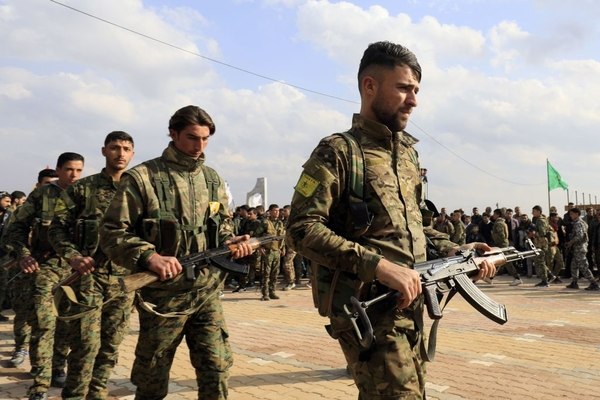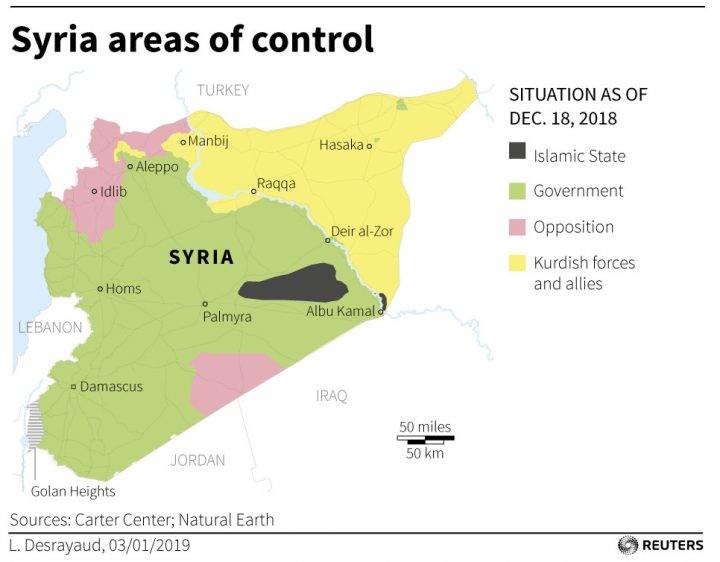Turkey to set up ‘security zone’ in Syria
January 17, 2019 | Expert Insights

In accordance with President Trump’s suggestion, Turkey will set up a 32km safe zone in northeastern Syria amidst a row over Turkey’s threat to attack the US-backed Kurdish militia when US troops withdraw from Syria.
Background
The Kurds or the Kurdish people are an Iranian ethnic group of the Middle East mostly inhabiting a contiguous area spanning adjacent parts of south-eastern Turkey, north-western Iran, northern Iraq, and northern Syria. The Kurds are culturally, historically, and linguistically classified as belonging to the Iranian people. Kurds form approximately 18 per cent of the population in Turkey (around14 million).
With the Ottoman Empire's collapse after World War I, the Kurds were promised an independent homeland in the 1920 Treaty of Sevres. But the treaty was never ratified. A Kurdish state was briefly established with support from the Soviet Union in Mahabad, northern Iran, in January 1947, but it collapsed 11 months later. Since then, there have been almost continuous Kurdish rebellions in Iran, Iraq and Turkey.
The U.S. needed a partner on the ground to fight the Islamic State group after its takeover of the eastern and northern third of Syria and found in the Kurds an effective, organized force. The U.S. armed the Kurdish militia, along with some Syrian Arabs and Christian Assyrians, and backed them with U.S. troops and airpower.
U.S.-Turkish relations have been strained by U.S. support for the Kurdish People's Protection Units (YPG) which Turkey views as a terrorist group and an extension of the outlawed Kurdistan Workers Party (PKK) that has for decades waged a separatist insurgency in Turkey. The Kurdish YPG has been a U.S. ally in the fight against the Islamic State (ISIS) jihadists and it controls swaths of northern Syria.

Analysis
Turkish President Recep Tayyip Erdogan said his country would set up a security zone in northern Syria as suggested by US President Donald Trump. The discussion came amid tensions about the US decision to withdraw its troops from Syria and over the fate of US-allied Kurdish fighters. Turkey regards the Kurdish People's Protection Units (YPG) as a terrorist group.
Turkish-backed Syrian rebels control a strip of territory between 13km and 30km deep that runs along the border from Afrin to the western bank of the River Euphrates. It was captured in two cross-border operations that Turkey has mounted since 201A6 as part of its efforts to counter the YPG.
For many weeks, Turkey had vowed to carry out military operations against the Kurdish YPG and has condemned the US for its military relationship with the armed group. The Trump administration has defended its YPG alliance and made the Kurdish fighters' safety a pre-condition to the US troop withdrawal.
Erdogan said he held a "quite positive" telephone conversation with Trump where he reaffirmed "a 20-mile [32-km] security zone along the Syrian border ... will be set up by us". The president added he and Trump reached "a historic understanding" during the phone call. Trump confirmed the idea of establishing a zone around the border, referring to the proposed area as a "safe zone". Erdogan said that if the US and other allies could provide logistical support, Turkey "would solve [the issue of] such a safe zone while protecting the security of those people there". He also dismissed the idea that the YPG could be involved in such a project. "They are terrorists. Can we leave the safe zone to terrorists?" he asked.
Differences between Washington and Ankara over the Kurdish YPG militia had soured talks between the two NATO partners. Trump threatened to "devastate" Turkey's economy if its forces attacked the Kurdish fighters, who helped Washington in its fight against the Islamic State of Iraq and the Levant (ISIL, ISIS). Opponents of US troop withdrawal from Syria had expressed fears that the Turkish military and allied Syrian Arab rebels would launch an offensive to drive YPG fighters away from the border, as they did in the predominantly Kurdish western Afrin region a year ago.
US Secretary of State Mike Pompeo said Washington wanted to provide security for those who have fought ISIL and to prevent any attack on Turkey from Syria. Sarah Sanders, White House press secretary, said in a statement: "The president expressed the desire to work together to address Turkey's security concerns in northeast Syria while stressing the importance to the United States that Turkey does not mistreat the Kurds and other Syrian Democratic Forces with whom we have fought to defeat ISIS."
Assessment
Our assessment is that US withdrawal from Syria may have left the Syrian Kurds vulnerable to Turkish threat of an invasion and Syrian government troops on the other. We feel that this move will act as a buffer and protect the Kurds who had anticipated that US support would dwindle after the pullout.








Comments